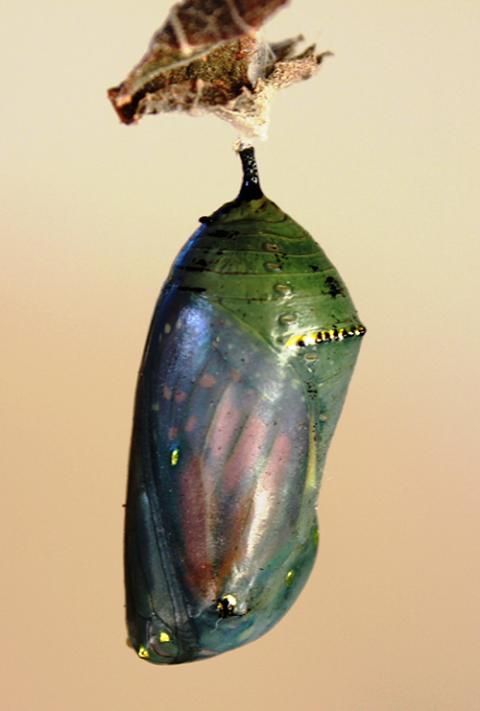
Finding value in unexpected places (Unsplash/Chrissie Kremer)
I've been drawn to salvaging things for as long as I can remember. Some of my most valued treasures came to me as one-of-a-kind finds while thrift shopping, garage sale-ing or dumpster diving (in my younger years). Reclaiming and repurposing old, discarded things to serve in new ways has always brought me joy. I find the usefulness of garden compost from food waste and the quirkiness of decorating my home with obsolete vintage items delightful in the same way.
It is true that one person's trash is another person's treasure (mine!). I've always looked for value and beauty in the most unlikely places. So, it's no surprise that the idea of redemptive transformation — the basic tenet of Christian faith and life — also resonates deeply with me.
Catholics conceptualize this transformation with the paschal mystery, which we celebrate through the sacrament of the Eucharist.
As the experience of Jesus reveals to us, one key characteristic of the paschal mystery is that it can be painful — often entailing the suffering of profound loss, including the heartbreak of death.
His story also shows us that new life can come from death, that we can find meaning in tough times, that there is light in the darkness. We are intimately familiar with the story: With the inevitable passing away, something new springs forth ... a phoenix rises from the ashes.
Lately, out of necessity, I have revisited my penchant to claim beauty and value from unlikely sources. I've been reflecting on new ways to draw strength and gain perspective on the relentlessly difficult realities crashing down in 2022.
I need to deal with the reality that 35 sisters in my congregation died in the past year — a similar toll as the prior year. I need to process the increasingly frequent climate catastrophes wreaking havoc across the globe.
Advertisement
I cannot change these realities, but I can reframe them with the deeper story of transformation. This story is reflected everywhere in creation and is rooted in my own faith tradition; so how can I be a friend to the paschal mystery? As a creator made in God's image, how can I work with this transformative process rather than resist it?
Transformation, by its very nature, consists of three phases: an ending — when something is dying or passing away; an in-between — the void left behind, created by absence; and a new beginning — when new life or movement emerges in its place.
As I ponder these overlapping, cyclical phases, the Dominican mission of praising, blessing and preaching seem applicable.
The ending phase of transformation is no doubt the harshest. What is mine to do as I watch the deaths, the unravelings, the tragic endings that these times bring? My call is to praise what has been. Praise is expressing gratitude for what God has done. I am here to witness, to honor and to bear what is falling away or dying.
The act of grieving is itself a form of praise for what's lost, and proper grieving cannot be shortcut. And where there is value, wisdom or beauty to be salvaged from what's falling away — that is also the critical work at hand.
Blessing the in-between phase of transformation is often overlooked or avoided: It can feel uncomfortable and precarious. How should I contend with the void left from what has fallen away, from what's ended? My work is to hold that space and to bless it, asking God to look favorably on it.

The in-between can feel precarious. (Unsplash/Jerry Phons G)
In sitting with the emptiness of what's gone and anticipating the hope that something new will emerge, I am invoking divine favor upon what's to come. This is how we make the in-between phase hospitable for new life to emerge, even while there's no indication that it will. Vigilance is critical to catch the signs of that life and patience is necessary to wait for it to take shape.
The pivot of transformation is discerning new life, new energy, a hopeful beginning that's taking shape in the place of loss. But this pivot isn't guaranteed, and it cannot be forced or driven for the sake of moving on. My job is rather to recognize the seeds of new life seeking to spring forth, to share what I'm seeing with others, and to nurture that growth where I'm called to do so.
People are intuitively drawn to beginnings — the excitement of something new is contagious and is meant to be preached. My service to new life is to try to articulate a vision as it is taking shape and inspire others with its potential. This is one way to preach the good news.
As a newer member in religious life, I'm so aware that I joined an institution in the ending phase of the transformative process. The Dominican Sisters of Sinsinawa are fortunate to have a handful of new women entering, but still, the demographics guarantee that the congregation, as it has existed, is coming to an end. Over the last decade, my sisters have helped me befriend the paschal mystery by showing me how to witness, honor and grieve what is passing away.
Recently, our leadership invited me to work with the congregation in planning for the future of Sinsinawa Mound — our home since we were founded 175 years ago. We can no longer sustain what's been built and so the buildings have become a physical symbol of what is falling away. Hundreds of thousands of square feet of empty space will be the physical manifestation of what we have lost, of what has ended. It is ours to bless.
Perhaps the buildings are meant to come down — an appropriate downsizing that reflects the end of an era and a return to nature. Or perhaps there is a new beginning looking to take shape out of what we're leaving behind. This is the in-between space that we hold: witnessing what must fall away while remaining hospitable to what might come.
The beauty of transformation is that, if your heart is in it, it will not disappoint. In blessing the in-between space, two things can happen. We will soften into the absence of what was, with a deepened appreciation for having witnessed it. And we might glimpse the beautiful possibilities meant to grow in its place. Both paths are true, and both are holy.
How can this story provide a framework for your life and for the world as you experience it? Think globally: What do you see unraveling? Think nationally: What do you sense is failing? Think locally: Are there personal losses that must be tended to? These are all opportunities to befriend the paschal mystery.







